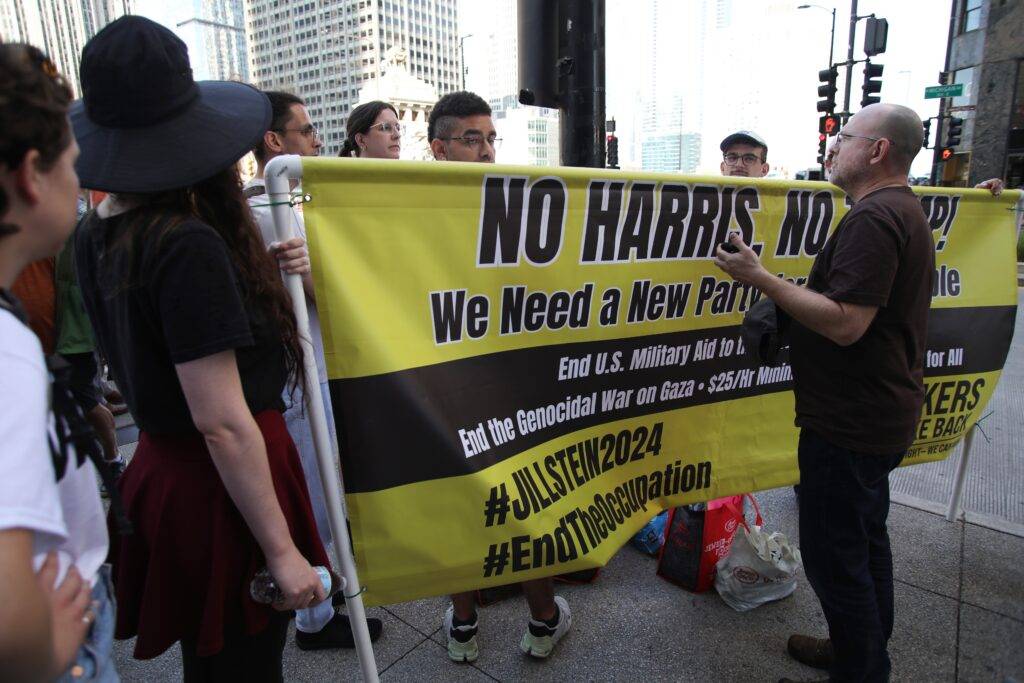In the 2024 U.S. presidential election, Green Party candidate Jill Stein emerged as a significant figure, particularly among Muslim voters in key battleground states like Michigan. Her outspoken stance on the Palestinian issue resonated with many voters dissatisfied with the major parties’ positions on the Middle East conflict. Both Russia and Iran had a role in deepening American societal divides by spreading both pro-Palestinian and pro-Israel disinformation.
There were numerous successful factors and voting groups that gave Donald Trump and his Republican party its decisive victory in the November election. But it was not only young white and Hispanic men that secured the result. A much less discussed factor was the escalation of the Middle East crises, its information war, and one particular third-party candidate, Greens’ Jill Stein with her campaign to solve the Palestinian question.
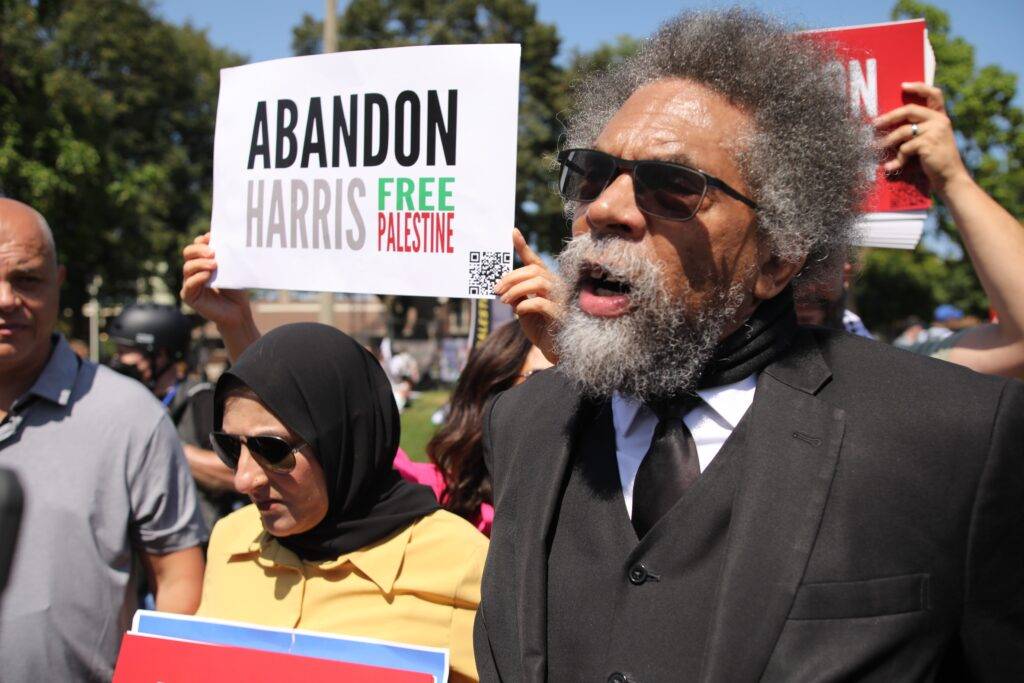
Jill Stein has been a vocal critic of U.S. foreign policy in the Middle East, especially regarding the Israeli-Palestinian conflict. She condemned Israel’s military actions in Gaza and criticized the Biden administration for its support of Israel, describing it as a “failure to intervene against what she termed Israel’s ‘genocidal rampage.'”
Repetition of 2016?
Stein’s platform included ending U.S. military aid to Israel and advocating for Palestinian rights, positions that distinguished her from the major party candidates. Yet, some Republicans supported Green Party candidate Jill Stein’s long-shot bid for the presidency, attempting to bolster a campaign that could siphon liberal voters from Vice President Kamala Harris. Did history repeat itself?
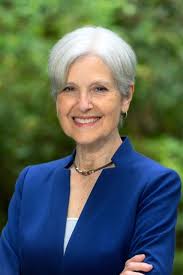
After nearly a decade, democrats are still smarting over Hillary Clinton’s loss there in 2016 when Stein was also on the ballot. Clinton’s 2016 campaign faced challenges similar to the Harris campaign in energizing leftist voters. Their perceived centrist policies and the Democratic Party’s establishment image led to voter apathy among progressives. This lack of enthusiasm contributed to lower turnout and support for third-party candidates, factors that played a role in Donald Trump’s electoral success, in 2016 and 2024. In 2000, liberal activist Ralph Nader, who ran on the Green Party ticket, paved the way for George W. Bush’s narrow defeat of Al Gore, particularly in the decider state of Florida.
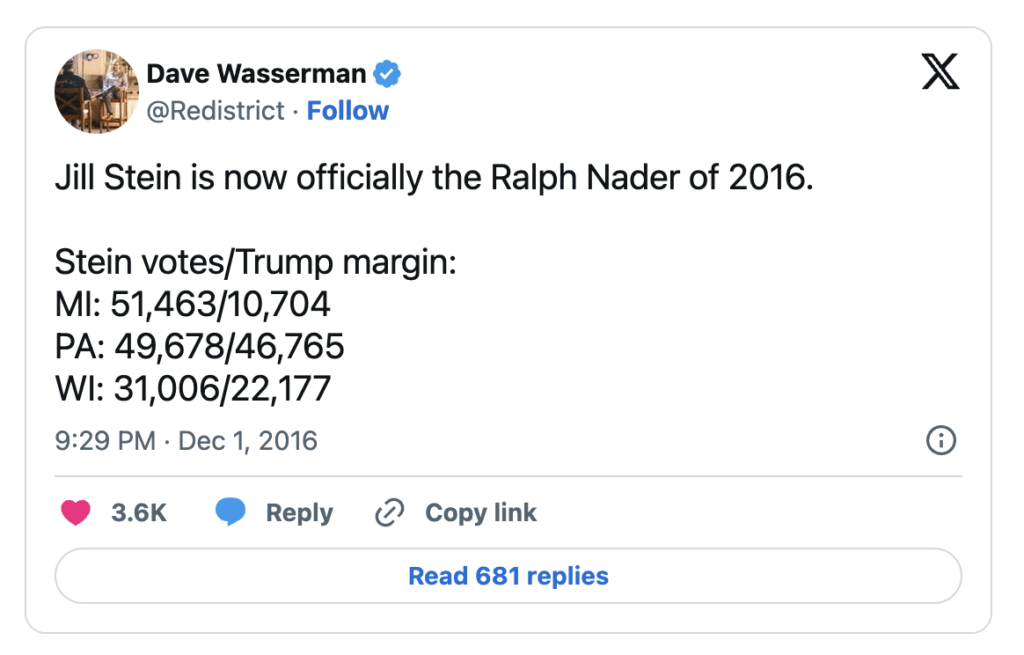
Other third-party candidates have previously played pivotal roles in U.S. elections, too. In 1992, Ross Perot’s independent candidacy drew significant support, leading to Bill Clinton’s victory over incumbent George H.W. Bush. In 2000, Pat Buchanan’s Reform Party candidacy faced internal sabotage, allegedly to prevent it from affecting Bush’s campaign. Roger Roger Stone, Trump’s ally, a longtime Republican operative, and a self-described political hitman, was heavily involved in both the downfall of Buchanan and the stirring up of riots to stop the vote recounts in Florida.
In 2024, both domestic and foreign efforts again contributed to a sense of disillusionment among some left-wing voters, leading to decreased enthusiasm for Democratic candidates. The amplification of intra-party divisions and the promotion of third-party alternatives resulted in lower voter turnout or support for candidates outside the two major parties, potentially affecting election outcomes.
Support Among Muslim Voters in Key States
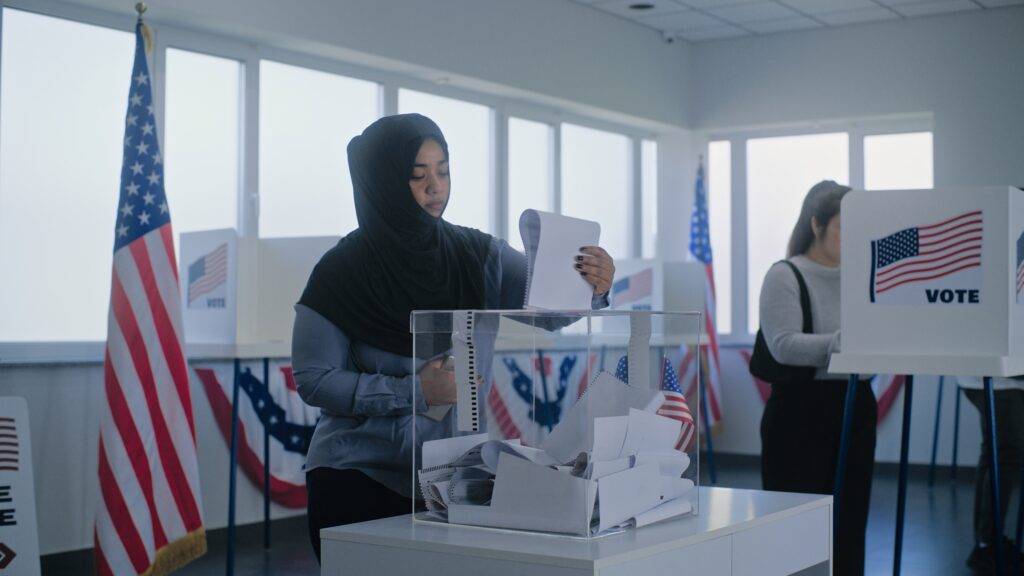
According to a poll conducted by Molitico Consulting in partnership with the Council on American-Islamic Relations (CAIR), the nation’s largest Muslim civil rights and advocacy organization, Muslim Americans showed strong support for Stein nationwide, with 53 percent backing her candidacy, compared to 21 percent for Trump and 20 percent for Harris.
In Michigan, Stein’s support was even more pronounced, with 59 percent of Muslim voters backing her, while Trump received 22 percent and Harris 14 percent. Michigan is home to over 200,000 Muslim voters and 300,000 residents with Middle Eastern or North African ancestry. In 2020, Biden secured the state with a margin of 154,000 votes, while Trump narrowly won it in 2016 by just 10,700 votes, representing a slim 0.23 percent victory.
Trump gained support in Hamtramck, Michigan, driven by frustration within Arab American and Muslim communities over the ongoing deaths in Gaza, Lebanon, and Yemen. These cities, which have the highest concentration of Arab Americans in the United States, became focal points for Trump’s campaign efforts. During his campaign, the former president visited both areas as part of his outreach strategy.
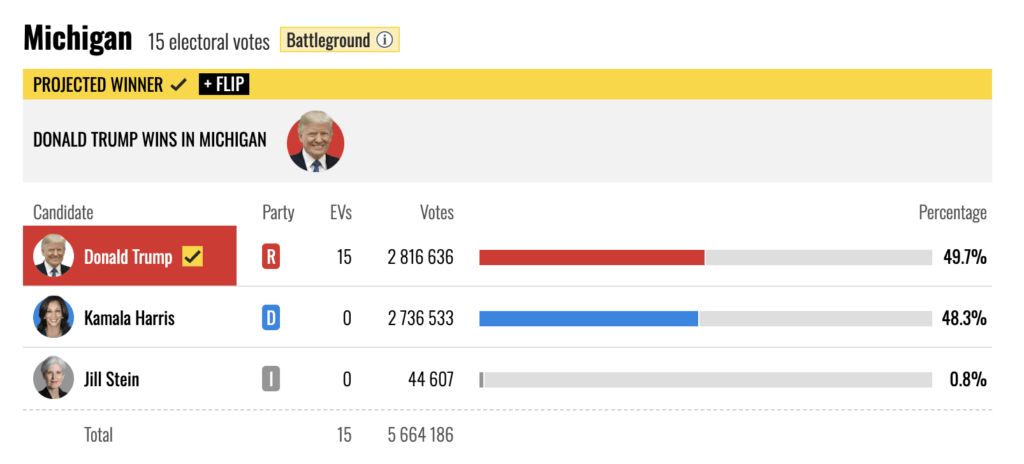
In the end, the Republican candidate won Michigan by 80,000 votes (Trump: 2.816636 / Harris: 2736533). Stein received 45,000 votes – not decisive, but still noteworthy. How many potential voters stayed at home or switched from Harris to Trump, because of the Middle East controversy, is yet unknown. There were signs of the Middle East question affecting the electoral outcomes also in Arizona and Wisconsin.
Republican Support for Third-Party Candidates
In the 2024 election, Republican operatives strategically bolstered third-party candidates like Cornel West and Robert F. Kennedy Jr., who later suspended his presidential bid and endorsed Trump to siphon votes from Democratic nominees. Some Republicans supported Green Party candidate Jill Stein’s campaign, viewing her as a potential spoiler for Vice President Kamala Harris. This support included assistance with ballot access and legal challenges in key battleground states, such as Nevada and Wisconsin.
Republican allies boosted longshot candidate Stein as Democrats tried to remove her from ballots in battleground states. Stein’s campaign had faced numerous legal challenges from Democratic groups attempting to remove her from state ballots. In response, Stein accepted legal assistance from prominent Republican-aligned lawyers, including Jay Sekulow, who represented Trump during his impeachment trials, and Michael D. Dean, who worked on lawsuits challenging the 2020 election results.
Stein gained support from the Republicans also in 2016, when Trump won the presidency with 306 electoral votes. The combined 46 electoral votes from Pennsylvania (20), Michigan (16), and Wisconsin (10) played a critical role in his victory. If voters who supported Green Party candidate Jill Stein in these three states had instead backed Clinton, Trump would have ended with just 260 electoral votes — 10 short of the 270 needed to win. According to the Cook Political Report’s popular vote tally, Clinton garnered 65,250,267 votes (48.1 percent), compared to Trump’s 62,686,000 votes (46.2 percent).
Russia Spread and Amplified Disinformation

Russia has adeptly exploited social and political fissures within the United States to advance its geopolitical interests. In the context of the Israel-Palestine conflict, Russian media and covert operations have amplified pro-Palestinian narratives to foment division. The New York Times highlighted that Russian media outlets have made overt and covert efforts to capitalize on the protests to denigrate democracy, inflame partisan tensions, and criticize the Biden administration ahead of the 2024 presidential election.
Additionally, the Kremlin-aligned network known as Doppelganger has employed sophisticated disinformation campaigns, creating fake versions of legitimate news sites to spread both pro-Palestinian and pro-Israel disinformation, thereby deepening societal divides. According to Wired, The Russian disinformation site closely mimics the authentic Washington Post website, with the only noticeable difference being a slight variation in the URL.
Washington Post reported that Russian disinformation videos pushed lies on voter fraud and immigrants. Before the 2024 US election, one of the sources of Russian disinformation was John Mark Dougan, a former U.S. Marine. Dougan has consistently claimed to operate independently of the Russian government, though receiving funding from an officer affiliated with the GRU, Russia’s military intelligence agency. In twelve months before, posts, articles, and videos generated by Dougan and some of the Russians who work with him garnered approximately 65 million views.
Iran Encouraged and Funded Protests
Iran has long positioned itself as a staunch supporter of the Palestinian cause, utilizing various channels to promote its agenda within the United States. The U.S. Office of the Director of National Intelligence reported that Iranian government actors sought to opportunistically leverage ongoing protests regarding the war in Gaza, providing funding and encouragement to stoke discord in American society.
However, Director of National Intelligence Avril Haines stated that U.S. citizens were protesting “in good faith” and that intelligence reports did not suggest otherwise. Meanwhile, reports indicate that Qatar contributed $4.7 billion to U.S. academic institutions between 2001 and 2021. Kenneth Marcus of the Brandeis Center suggested that such financial ties may have influenced university administrators’ reluctance to enforce disciplinary measures.
This influence was particularly evident on university campuses, where pro-Palestinian sentiments often align with broader critiques of U.S. foreign policy. Iranian-backed organizations and media outlets disseminated content that resonated with student activists, fostering an environment conducive to large-scale demonstrations. These protests frequently criticized U.S. support for Israel, indirectly challenging the Democratic Party’s policies.
China: From Weapons Provider to Conflict Mediator

China faces a challenging balancing act due to its long-standing support for the Palestinian cause. This alignment dates back to the early days of the Chinese Communist Party under Mao Zedong, who provided weapons to Palestinians as part of his broader support for “national liberation” movements worldwide. Mao even likened Israel to Taiwan, viewing both as outposts of Western imperialism backed by the United States.
Today, China is aiming to maintain favorable relations with both Israel and Arab nations. Its state-controlled media have been observed amplifying pro-Palestinian sentiments, often framing the U.S. as a destabilizing force in the Middle East. This narrative serves to undermine U.S. credibility and influence, both domestically and internationally.
Furthermore, China’s close relationship with Iran, a principal supporter of Palestinian groups, positions Beijing as a potential mediator in the conflict. This role allows China to project itself as a peace broker while subtly critiquing U.S. policies in the region.
There has been a prolonged debate over whether the Chinese-owned social media platform TikTok had a pivotal role in the spreading of the pro-Palestinian demonstrations at American university campuses. According to the National Contagion Research Institute, which studies the spread of online hate, there is substantial evidence that content on TikTok is “promoted or muted” depending on “whether it is aligned or opposed to the interests of the Chinese government.” In one month only, after the terrorist attack on October 7th, 2023, #FreePalestine was used in 214,000 videos posted to TikTok from the United States. Those videos were viewed 525 million times, according to TikTok’s publicly available data.
Research conducted by Laura Edelson, a researcher at Northeastern University in Boston, in collaboration with POLITICO, revealed that during the first four months after the escalation of the Gaza conflict, TikTok hosted approximately 20 times more pro-Palestinian content than pro-Israeli material, based on hashtag analysis. However, TikTok’s algorithm, like those of other social media platforms, amplifies popular content to maximize user engagement. However other social platforms do control extreme political and violent content. For some reason, with the Hamas vs. Israel conflict, the Chinese state-controlled company decided not to.
Further Reading:
- Rosenstone, S. J., Behr, R. L., & Lazarus, E. H. (1996). Third Parties in America: Citizen Response to Major Party Failure. Princeton University Press.
- Gillespie, J. D. (2012). Challengers to Duopoly: Why Third Parties Matter in American Two-Party Politics. University of South Carolina Press.
- Herrnson, P. S., & Green, J. C. (Eds.). (2002). Multiparty Politics in America: Prospects and Performance. Rowman & Littlefield Publishers.
- Rid, T. (2020). Active Measures: The Secret History of Disinformation and Political Warfare. Farrar, Straus and Giroux.
- Jamieson, K. H. (2018). Cyberwar: How Russian Hackers and Trolls Helped Elect a President. Oxford University Press.
- Levin, D. H. (2020). Meddling in the Ballot Box: The Causes and Effects of Partisan Electoral Interventions. Oxford University Press.
Read More:
- The Detroit Metro Times: Most Michigan Muslims voted for Jill Stein, followed by Trump, exit poll suggests
- Reuters: Jill Stein sees ‘no lesser evil’ between Harris, Trump
- Politico: Harris faces an ‘uncommitted’ quandary of her own
- Middle East Eye: Pro-Palestine activists who heckled Kamala Harris in Detroit call for nationwide disruptions
- People’s World: “Get Me Roger Stone”: Documentary on GOP mastermind of dirty tricks
- Variety: ‘Stop the Recount’: How the Chaotic End of the 2000 Presidential Election Sowed Seeds of Today’s Political Fury
- PBS: Roger Stone
- Al Jazeera: Harris tells pro-Palestine protesters ‘now is time for ceasefire’ in Gaza
- Cornell Daily Sun: Choosing the ‘Lesser Evil’: How Pro-Palestinian Cornellians Navigated the 2024 Presidential Election
- PBS: What does voter turnout tell us about the 2016 election?
- PBS: A Third Choice
- Wired: A Russian Influence Campaign Is Exploiting College Campus Protests
- Washington Post: American creating deepfakes targeting Harris works with Russian intel, documents show
- CBS: Republican allies boost longshot candidate Jill Stein as Democrats try to remove her from ballots in battleground states
- History: Here’s How Third‑Party Candidates Have Changed Elections
- Fordham Democratic Project: Third Parties and the Electoral College: How Ranked Choice Voting Can Stop the Third-Party Disruptor Effect
- Vox: The weird, true story of the most successful third-party presidential candidate in the past century
- UCL / Comment: US election: third party candidates can tip the balance in a tight race
- RealPolitics: Third Parties on the Horizon: What Does History Say
- The Science Survey: Don’t Underestimate the Power of Third Party Candidates
- MinnPost: Third parties will affect the 2024 campaigns
- Pew Research: Third-party and independent candidates for president often fall short of early polling numbers
- Al Jazeera: US candidate Jill Stein considering vocal Palestine advocates for VP spot
- The Times of Israel: Awash in Qatari money, have US campuses become incubators for Doha’s interests?
- GBH: Stein leads Harris among Muslim voters in several swing states, new analysis finds
- Michigan Public: A new poll finds a surprising presidential choice for Muslim American voters in Michigan
- The Arab American: Poll: American Muslims in Michigan prefer Green Party candidate Jill Stein over Harris and Trump
- WKAR: Green Party presidential candidate says she’s the option for Michigan’s Arab and Muslim voters
- Al Jazeera: Trump or Harris? Gaza war drives many Arab and Muslim voters to Jill Stein
- Newsweek: Michigan’s Muslim Voters Sent Kamala Harris a ‘Message’—Democrat
- Wikipedia: 2000 Reform Party presidential primaries
- DNI: Statement from Director of National Intelligence Avril Haines on
Recent Iranian Influence Efforts - Wikipedia: 2024 pro-Palestinian protests on university campuses
- TAG24: Jill Stein sees massive surge among Muslim voters in new 2024 exit poll
- Wikipedia: Jill Stein 2024 presidential campaign
- The Wall Street Journal: Republicans Boost Jill Stein as Potential Harris Spoiler
- Washington Post: Russian disinformation videos push lies on voter fraud and immigrants
- Salon: Jill Stein spoiled the 2016 election for Hillary Clinton
- BBC: Dearborn, Michigan: A visit to the first Arab-majority city in the US
- BBC: What China wants from Israel-Hamas war
- KQED: ‘An Opportunity’: How Do Pro-Palestinian Advocates Feel About a Kamala Harris Candidacy?
- Time: The Truth About Iran’s Efforts to Promote Gaza Protests
- Newsweek: Kamala Harris’ Attempts To Stifle Pro-Palestinian Dissent Aren’t Working
- Al Jazeera: AIPAC is growing desperate
- Politico: NYC kickoff rally for Harris confronts pro-Palestinian demonstration
- The Nation: Palestinian Exclusion Shows the Limits of Kamala Harris’s Politics of Joy
- Independent: Kamala Harris mentioned Palestinians in her DNC speech. But what can Uncommitted delegates expect now?
- Newsweek: Michigan’s Muslim Voters Sent Kamala Harris a ‘Message’—Democrat
- Britannica: Jill Stein
- Washington Post: American creating deepfakes targeting Harris works with Russian intel, documents show
- Washington Post: Russian disinformation videos push lies on voter fraud and immigrants
- CBS: Republican allies boost longshot candidate Jill Stein as Democrats try to remove her from ballots in battleground states
- CBS: Cornel West to appear on Virginia presidential ballot
- Wall Street Journal: Republicans Boost Jill Stein as Potential Harris Spoiler
- AP: Arab American voters make their choice — Harris, Trump or neither — in the election’s final days
- New York Post: US accuses Russia of using state media to spread disinformation before the November election
- Politico: Foreign influence efforts are circling the presidential election. Again.
- Wikipedia: Foreign interference in the 2024 United States elections
- Brandeis University: Iran’s Eastward Turn to Russia and China
- Chatham House: China’s approach to the war in Gaza is not anti-Israel. It’s designed to contain the US
- Al Jazeera: What’s behind Russia’s ‘soft power’ moves on Israel-Palestine?
- Al Jazeera: Kamala Harris shifts tone on Gaza, but advocates say US voters want more
- AP: Arab American voters make their choice — Harris, Trump or neither — in the election’s final days
- NBC: Is it TikTok? Here’s why some young Americans sympathize with Palestinians
- New York Post: We learn hate for Israel on TikTok and Instagram say young protesters
- Forward: Young Americans are turning against Israel — and you can thank TikTok
- The Times of Israel: TikTok’s pro-Israel investors face dilemma as platform blamed for fueling antisemitism
- LA Times: At USC, arrests. At UCLA, hands off. Why pro-Palestinian protests have not blown up on UC campuses
- Politico: Anatomy of a scroll: Inside TikTok’s AI-powered algorithms
- Wall Street Journal: How TikTok Brings War Home to Your Child

